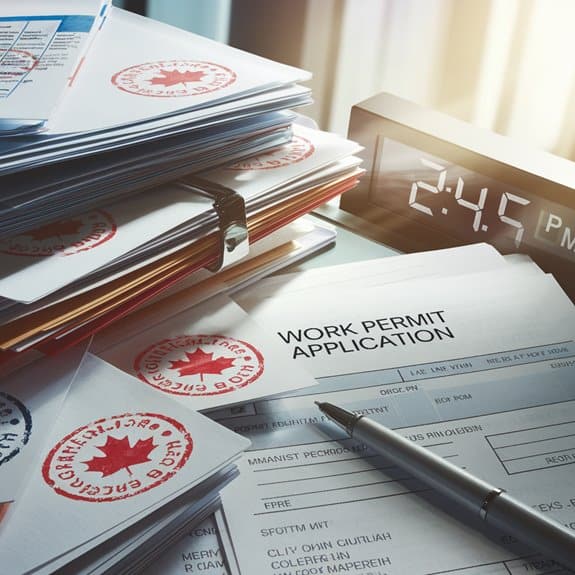What Is an LMIA-Based Work Permit and Why Is It Required?
An LMIA-Based Work Permit allows a foreign national to work in Canada legally under the sponsorship of an approved Canadian employer. Before this permit can be issued, the employer must obtain a Labour Market Impact Assessment (LMIA)—a document issued by Employment and Social Development Canada (ESDC) confirming that no qualified Canadian or permanent resident is available to fill the position.
At Northia Immigration Consultancy, we assist both employers and foreign workers in navigating the LMIA process to ensure full compliance with immigration regulations and to support a successful Canada immigration application.
An LMIA-based work permit is typically required when:
A Canadian employer is hiring a foreign worker for a position that does not qualify for an LMIA exemption
The role has been advertised locally, but no suitable Canadian candidates have been found
The employer must demonstrate that hiring a foreign worker will have a neutral or positive effect on the Canadian labor market


Who Needs to Meet LMIA Work Permit Requirements?
Both Canadian employers and foreign workers have specific obligations when applying for an LMIA-based work permit. Meeting these requirements is essential for approval and long-term immigration success.
Employers must:
Obtain a positive LMIA from ESDC confirming the labor shortage
Show proof of recruitment efforts within Canada
Offer wages that meet or exceed the regional median wage
Follow Canadian labor laws and workplace safety standards
Cooperate with possible audits or inspections
Foreign workers must:
Have a valid job offer from an LMIA-approved employer
Meet the qualifications and experience required for the position
Pass medical and security checks, if applicable
Submit a complete Canada immigration application before beginning work
At Northia Immigration, we support both parties—helping employers manage LMIA compliance and guiding foreign workers through the permit process for a smooth transition into the Canadian workforce.
Pathway to Permanent Residency
An LMIA-based work permit can be a stepping stone to permanent residency in Canada. Many workers transition from temporary status to permanent through federal and provincial immigration programs.
Pathways include:
Express Entry – For skilled workers eligible under the Canadian Experience Class (CEC) or Federal Skilled Worker Program (FSWP)
Provincial Nominee Program (PNP) – For workers nominated by a Canadian province based on local labor needs
Employer-Supported PR Streams – Some provinces offer employer-driven immigration streams tied to long-term job offers
At Northia Immigration, we not only help you get your work permit, but also develop a long-term plan for securing your permanent visa Canada.
How Northia Immigration Can Help
Navigating the LMIA-based work permit process can be complex—for both employers and workers. Our team provides reliable support at every stage, from assessing job eligibility to preparing permit applications and transitioning to permanent residency.
We offer:
LMIA application assistance for employers
Full work permit support for foreign workers
Strategic planning for PR eligibility through Express Entry or PNP
Ongoing compliance support and legal guidance
Let us guide you through the LMIA and Canada immigration process—whether you’re an employer hiring talent or a worker seeking new opportunities in Canada.
Need Help? Start Here.
Frequently Asked Questions
What is an LMIA and why is it necessary?
An LMIA (Labour Market Impact Assessment) is a document issued by ESDC that confirms no qualified Canadian citizen or permanent resident is available for the job. It is a key requirement for employers who want to hire foreign workers for most positions.
How long does it take to get an LMIA?
Processing times vary depending on the job type, location, and stream (e.g., high-wage or low-wage). On average, it can take 2 to 8 weeks, but may be longer during peak periods.
Can a foreign worker start working immediately after applying?
No. The foreign worker must first receive a work permit approval from IRCC before beginning employment, even after a positive LMIA has been issued.
Is an LMIA work permit tied to one employer?
Yes. An LMIA-based work permit is employer-specific, meaning the worker can only work for the employer listed in the permit. A new LMIA and work permit are needed to change jobs.
Can an LMIA-based work permit lead to permanent residency?
Yes. Many foreign workers transition to permanent residency through Express Entry or a Provincial Nominee Program (PNP) after gaining Canadian work experience.
What happens if the LMIA is refused?
If the LMIA is denied, the employer cannot proceed with hiring the foreign worker under that application. At Northia Immigration, we help identify issues, suggest improvements, and reapply if appropriate.
Ready to Start Your Canadian Immigration Journey?
Connect with Northia Immigration Consultancy today for personalized guidance and trusted support every step of the way.

Submit An Inquiry
Have questions? Submit an inquiry and we’ll get back to you with the guidance you need.

Book a Consultation
We offer a 30-minute free initial service consultation. Get to know us and ask questions!

Latest News
Read Northia's latest news for recent government changes and tips for your application!

